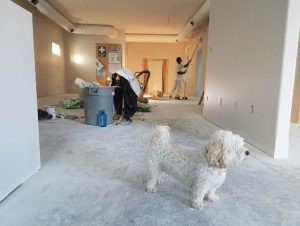As is the case with any real estate investment, success is never a guarantee when flipping a home. Although many flips produce healthy returns, a fair number of them are sold at losses. While this is sometimes the result of factors that are outside of flippers’ control, failed flips are often the fault of inexperience and a lack of interest in learning. So, if you’ll soon be tackling your first flip, take some time to educate yourself on some of the most common blunders made by your fellow flippers.

Overpaying for Properties
Overpaying for a potential flip stands to reduce how much of a profit you’re ultimately able to rake in. So, before proceeding to make a serious offer, make sure to do some location research. Given how important location is to the value of a home, familiarizing yourself with everything an area has to offer can effectively prevent you from paying more than a property is worth.
To form a clear picture of how profitable an area is, take some time to research local property values and rental rates. Should you notice that similar homes in the area have much lower price tags attached to them, ask the seller to explain what makes their property so much more valuable. Furthermore, looking into population size, rate of growth and median income can provide you with a solid understanding of how much demand for housing exists within a certain locale. While location research may strike you as cumbersome, it’s crucial for house flippers who are curious about how to tell if a real estate market is overpriced.
Failing to Have Potential Flips Inspected
Formal inspections from certified home inspectors are important for a variety of reasons. For one thing, in the absence of such inspections, flippers aren’t likely to become aware of pressing issues until long after deals have gone through. Furthermore, not having a property professionally inspected is liable to make budgeting for a flip impossible. After all, if you don’t have an accurate accounting of a property’s outstanding problems, how will you know how much capital to procure?
With this in mind, make a formal inspection a prerequisite for any property purchase in which you’re involved. If a seller is vehemently opposed to allowing an inspection to take place, this should be regarded as a sign that they’re attempting to conceal serious issues with the property. Given how much money is involved with a purchase of this size, you can’t afford to take any chances. So, if a seller refuses to allow the property to be inspected, walk away from the deal and start exploring other prospective flips.
Working with the Wrong Contractors
The contractors you work with can play a large role in determining how smoothly the flipping process plays out. While dependable contractors can be an absolute joy to work with, unreliable contractors can make things more stressful at every conceivable turn. So, in the interest of getting through your first house flip with your sanity – and financial resources – fully intact, be selective when seeking out the right contractors.
To start with, steer clear of unlicensed contractors. Any contractor with whom you do business should be licensed, registered or certified to practice in your area. Although unlicensed contractors tend to charge lower fees, they lack proper incentive to stay with jobs until the end, treat clients with courtesy and provide honest estimates. While you may view hiring unlicensed contractors as an exercise in cost-effectiveness, this decision is liable to cost you a lot more money than it stands to save you.
Additionally, any contractor you hire should be properly insured. A lack of insurance can result in you being held financially responsible for any medical costs they incur or property damage they cause while doing work for you. As such, confirm that any contractor you’re interested in hiring is covered by general liability, professional liability, commercial auto, worker’s compensation, inland marine and business owner’s policy (BOP) insurance. Furthermore, depending on the type of work you’re having done, additional types of insurance coverage may be required.

A successful house flip stands to net you a handsome profit within a fairly short time-frame. Conversely, a poorly-planned, ill-conceived flip may bleed your finances dry and leave you burning with regret. That being the case, it’s important for fledgling flippers to educate themselves before proceeding to tackle their first flips. The more knowledge you have going in, the less likely you are to make a variety of rookie mistakes.




Leave a Reply